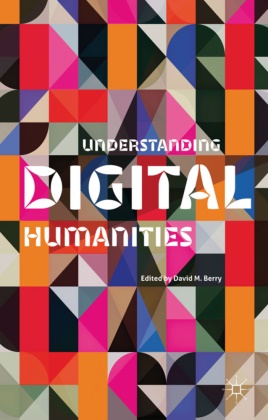Mehr lesen
Zusatztext 'Berry and colleagues present us with several current and future trajectories of the digital humanities! both building and questioning its trends. Through the last 40 years of computational research! the humanities have appropriated and developed many techniques for doing their work computationally! but only in the last ten years has the excess of computational capacity begun to bring central questions about the nature of the humanities to light. David Berry and his colleagues sit on the cutting edges of these questions! and their work will inform those debates for years to come.' - Jeremy Hunsinger! Virginia Polytechnic Institute and State University! USA 'This book introduces and debates important questions regarding the use of digital technologies in numerous academic approaches in humanities and social sciences. These new media technologies are impacting across the disciplinary spectrum and pose challenges to traditional scholarship. Dr Berry's book gives us a timely insight into these various challenges and into the kinds of new 'digital humanities' that are emerging. Clearly written and providing a wide range of examples and case studies it is an important contribution to the growing literature on digital humanities.' - Christian De Cock! University of Essex! UK Informationen zum Autor Edited By David M. Berry Klappentext Confronting the digital revolution in academia, this book examines the application of new computational techniques and visualisation technologies in the Arts & Humanities. Uniting differing perspectives, leading and emerging scholars discuss the theoretical and practical challenges that computation raises for these disciplines. Zusammenfassung Confronting the digital revolution in academia, this book examines the application of new computational techniques and visualisation technologies in the Arts & Humanities. Uniting differing perspectives, leading and emerging scholars discuss the theoretical and practical challenges that computation raises for these disciplines. Inhaltsverzeichnis Acknowledgements Introduction: Understanding the Digital Humanities; D.M.Berry An Interpretation of Digital Humanities; L.Evans & S.Rees How We Think: Transforming Power and Digital Technologies; N.K.Hayles Digital Methods: Five Challenges; B.Rieder & T.Röhle Archives in Media Theory: Material Media Archaeology and Digital Humanities; J.Parikka Canonicalism and the Computational Turn; C.Bassett The Esthetics of Hidden Things; S.Dexter The Meaning and the Mining of Legal Texts; M.Hildebrandt Have the Humanities Always been Digital? For an Understanding of the 'Digital Humanities' in the Context of Originary Technicity; F.Frabetti Present, Not Voting: Digital Humanities in the Panopticon; M.Terras Analysis Tool or Research Methodology: Is There an Epistemology for Patterns?; D.Dixon Do Computers Dream of Cinema? Film Data for Computer Analysis and Visualization; A.Heftberger The Feminist Critique: Mapping Controversy in Wikipedia; M.Currie How to See One Million Images? A Computational Methodology for Visual Culture and Media Research; L.Manovich Cultures of Formalization: Towards an Encounter Between Humanities and Computing; J.van Zundert, A.Antonijevic, A.Beaulieu, K.van Dalen-Oskam, D.Zeldenrust & T.Andrews Trans-disciplinarity and Digital Humanity: Lessons Learned from Developing Text Mining Tools for Textual Analysis; Y.Lin Index...
Inhaltsverzeichnis
Acknowledgements Introduction: Understanding the Digital Humanities; D.M.Berry An Interpretation of Digital Humanities; L.Evans & S.Rees How We Think: Transforming Power and Digital Technologies; N.K.Hayles Digital Methods: Five Challenges; B.Rieder & T.Röhle Archives in Media Theory: Material Media Archaeology and Digital Humanities; J.Parikka Canonicalism and the Computational Turn; C.Bassett The Esthetics of Hidden Things; S.Dexter The Meaning and the Mining of Legal Texts; M.Hildebrandt Have the Humanities Always been Digital? For an Understanding of the 'Digital Humanities' in the Context of Originary Technicity; F.Frabetti Present, Not Voting: Digital Humanities in the Panopticon; M.Terras Analysis Tool or Research Methodology: Is There an Epistemology for Patterns?; D.Dixon Do Computers Dream of Cinema? Film Data for Computer Analysis and Visualization; A.Heftberger The Feminist Critique: Mapping Controversy in Wikipedia; M.Currie How to See One Million Images? A Computational Methodology for Visual Culture and Media Research; L.Manovich Cultures of Formalization: Towards an Encounter Between Humanities and Computing; J.van Zundert, A.Antonijevic, A.Beaulieu, K.van Dalen-Oskam, D.Zeldenrust & T.Andrews Trans-disciplinarity and Digital Humanity: Lessons Learned from Developing Text Mining Tools for Textual Analysis; Y.Lin Index
Über den Autor / die Autorin
DAVID BERRY is Lecturer in Media and Communication at the University of Swansea. He is the author of Understanding Softward in the Digital Age: Code, Mediation and Computation (Palgrave, forthcoming)Copy, Rip, Burn: The Politics of Copyleft and Open Source (Pluto, 2008) and co-editor of Libre Culture (Pygmalion Books, Canada, 2008). He has also published in journals such as Theory, Culture and Society, Critical Discourse Studies and The Journal of Internet Research.
Bericht
'Berry and colleagues present us with several current and future trajectories of the digital humanities, both building and questioning its trends. Through the last 40 years of computational research, the humanities have appropriated and developed many techniques for doing their work computationally, but only in the last ten years has the excess of computational capacity begun to bring central questions about the nature of the humanities to light. David Berry and his colleagues sit on the cutting edges of these questions, and their work will inform those debates for years to come.' - Jeremy Hunsinger, Virginia Polytechnic Institute and State University, USA
'This book introduces and debates important questions regarding the use of digital technologies in numerous academic approaches in humanities and social sciences. These new media technologies are impacting across the disciplinary spectrum and pose challenges to traditional scholarship. Dr Berry's book gives us a timely insight into these various challenges and into the kinds of new 'digital humanities' that are emerging. Clearly written and providing a wide range of examples and case studies it is an important contribution to the growing literature on digital humanities.' - Christian De Cock, University of Essex, UK

